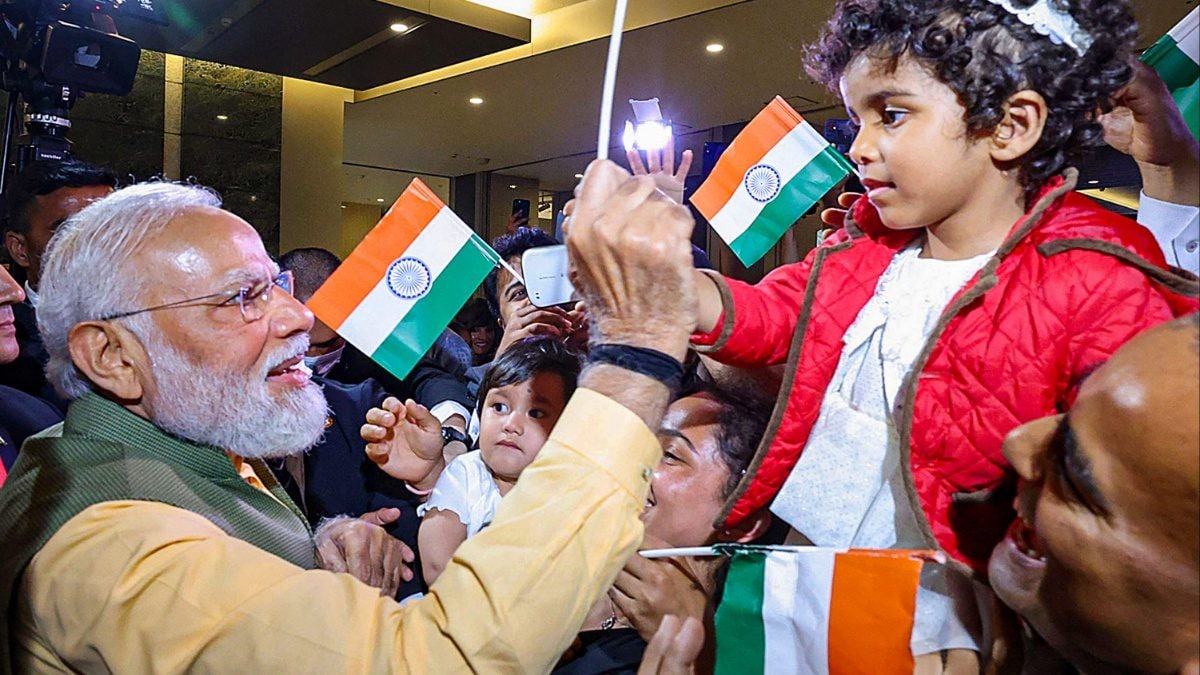PM Modi Says India Prioritising Resolving Global South’s Challenges as G20 Chair

Prime Minister Narendra Modi being welcomed by the Indian diaspora in Hiroshima, Japan. (Image: PTI)
Prime Minister Narendra Modi outlined that India is committed to resolving the ‘Global South’s’ challenges and highlighted the importance of G7 and G20 collaboration.
Prime Minister Narendra Modi on Saturday highlighted the importance of cooperation with G7 and G20 while speaking to Japanese news agency Yomiuri Shimbun in Hiroshima where he has been invited by G7 chair Japanese Prime Minister Fumio Kishida.
“As the G20 chair, I will represent the perspectives and priorities of the Global South at the G7 Summit in Hiroshima. Strengthening collaboration between the G7 and G20 is vital in addressing global challenges like climate change, supply chain disruptions, economic recovery, energy instability, healthcare, food security, and peace and security,” PM Modi was quoted as saying by Yomiuri Shimbun. The Prime Minister said that both institutions are crucial platforms for global cooperation.
PM Modi reiterated his commitment to resolving challenges faced by the ‘Global South’ which includes developing and emerging nations as G20 chair. India is holding the current presidency of G20 and the G20 leadership summit will be held later this year in New Delhi. India is also the current chair of the Shanghai Cooperation Organization (SCO).
The informal group of leading industrialised nations consisting of Canada, France, Germany, Italy, Japan, the United Kingdom and the United States are meeting in Hiroshima. This year, the leaders of Australia, Brazil, Comoros, Cook Islands, India, Indonesia, South Korea and Vietnam are invited as G7 aims to reach out to developing countries in the so-called Global South.
“India aims to serve as a bridge between different voices, promoting a constructive agenda focused on achieving shared objectives for the betterment of humanity,” PM Modi said.
Outreach to the “Global South” is a theme for the summit, underscoring both the rising economic importance of countries such as India and the vast inroads China has made across developing markets – building infrastructure and extending finance, news agency Reuters said in a report.
When asked about China’s increasing assertiveness in the South China Sea and East China Sea regions as well as rising tensions in the Taiwan Strait, PM Modi said India continues to uphold sovereignty, peaceful dispute resolution and adherence to international law when it comes to maritime disputes.
He further added that India will protect its sovereignty while promoting peaceful resolving of maritime disputes. “India has successfully resolved land and maritime boundaries with Bangladesh, showcasing its approach,” PM Modi said.
G7 leaders vowed to strengthen sanctions against Russia and reduce dependence on trade with China in a draft communique.
The G7 committed to limiting exports to Russia aiding Putin’s aggression and combating sanctions violations.
Speaking on the war in Ukraine, Prime Minister Narendra Modi told the Yomiuri Shimbun that India advocates for dialogue and diplomacy to resolve disputes.
When asked about India’s oil purchase from Russia, PM Modi highlighted that India is committed to “prioritising the well-being of people affected by rising costs of essentials”.
He said that India abstained from UN resolutions but condemned the hostilities, but remains committed to upholding UN Charter, international law, sovereignty, and territorial integrity and supports peaceful resolution in Ukraine.
“India supports a peaceful resolution to the Ukraine crisis and is ready to contribute constructively within the UN and beyond,” PM Modi was quoted as saying by Yomiuri Shimbun.
(with inputs from Shailendra Wangu)
For all the latest world News Click Here


